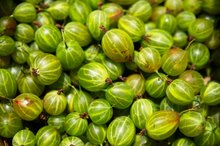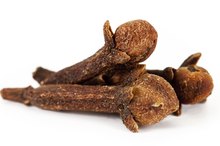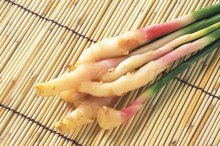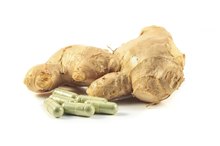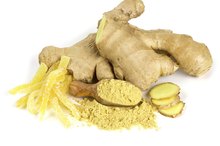What does fact checked mean?
At Healthfully, we strive to deliver objective content that is accurate and up-to-date. Our team periodically reviews articles in order to ensure content quality. The sources cited below consist of evidence from peer-reviewed journals, prominent medical organizations, academic associations, and government data.
- Mayo Clinic: Dizziness
- Mayo Clinic: Ginkgo
- National Center for Complementary and Alternative Medicine: Ginger
- Mayo Clinic: Dizziness: Lifestyle and Home Remedies
The information contained on this site is for informational purposes only, and should not be used as a substitute for the advice of a professional health care provider. Please check with the appropriate physician regarding health questions and concerns. Although we strive to deliver accurate and up-to-date information, no guarantee to that effect is made.
Herbs & Tea for Vertigo
For some people, vertigo, or dizziness, is so severe it leads to nausea, vomiting and loss of balance, which may in turn result in injurious falls. Migraine headaches, Meniere's disease, an acoustic neuroma, an inflamed inner ear or other underlying health conditions can cause vertigo. Talk to your doctor about the cause of your vertigo and whether herbal remedies are appropriate treatments.
If you are experiencing serious medical symptoms, seek emergency treatment immediately.
Ginger
Ginger is a famous food flavoring and an essential ingredient in hosts of baked goods, Asian dishes, beverages and more. As a medicinal tea, ginger is sipped to reduce stomach discomfort, joint and muscle pain, and pregnancy-related sickness. Also available in capsule and tablet forms, ginger is accessible over the counter. Vertigo sufferers may use the herb to ease nausea caused by motion. Talk to your doctor before using ginger for vertigo.
- Ginger is a famous food flavoring and an essential ingredient in hosts of baked goods, Asian dishes, beverages and more.
- As a medicinal tea, ginger is sipped to reduce stomach discomfort, joint and muscle pain, and pregnancy-related sickness.
Gingko Biloba
Herbs for Vertigo
Learn More
Ginkgo leaf extract is an ancient herbal remedy taken from the ginkgo -- one of the oldest varieties of trees in the world. Today, ginkgo biloba is made into capsules, teas and tablets, which are used for manifold health purposes. Active substances in ginkgo biloba are purported to improve blood flow and enhance cognitive functioning, decrease fatigue and reduce dizziness, making ginkgo biloba a potential remedy for vertigo. Today, the herb is among the most widely purchased herbs in America. Talk to your doctor about the safety and efficacy of ginkgo biloba.
- Ginkgo leaf extract is an ancient herbal remedy taken from the ginkgo -- one of the oldest varieties of trees in the world.
- Today, ginkgo biloba is made into capsules, teas and tablets, which are used for manifold health purposes.
Considerations
In conjunction with teas and herbs for vertigo, consider using other remedies and safety measures. Sitting or lying down when you feel dizzy may help prevent dangerous falls. Using safety devices, such as canes, walkers and grab bars in the bathroom and shower may help as well. In addition, the experts at the Mayo Clinic suggest avoiding caffeine, alcohol and tobacco, which can restrict blood vessels and increase vertigo symptoms 1.
- In conjunction with teas and herbs for vertigo, consider using other remedies and safety measures.
- Using safety devices, such as canes, walkers and grab bars in the bathroom and shower may help as well.
Side Effects and Cautions
Herbs for Vestibular Disorders
Learn More
Similarly to conventional medicines, herbs can cause dangerous side effects and drug interactions. In most cases, ginger is safe when consumed in small doses; however, some people experience gas and gastrointestinal upset. Ginkgo biloba is also well tolerated, but it can increase bleeding and cause complications for people who use blood-thinning medications. Always consult a doctor or trusted healthcare professional before using herbs to treat vertigo or other conditions.
- Similarly to conventional medicines, herbs can cause dangerous side effects and drug interactions.
- Ginkgo biloba is also well tolerated, but it can increase bleeding and cause complications for people who use blood-thinning medications.
Related Articles
References
- Mayo Clinic: Dizziness
- National Center for Complementary and Alternative Medicine: Ginger
- Mayo Clinic: Dizziness: Lifestyle and Home Remedies
- Mei N, Guo X, Ren Z, Kobayashi D, Wada K, Guo L. Review of ginkgo biloba-induced toxicity, from experimental studies to human case reports. J Environ Sci Health C Environ Carcinog Ecotoxicol Rev. 2017;35(1):1-28. doi:10.1080/10590501.2016.1278298
- Xiong XJ, Liu W, Yang XC, et al. Ginkgo biloba extract for essential hypertension: a systemic review. Phytomedicine. 2014;21(10):1131-6. doi:10.1016/j.phymed.2014.04.024
- Weinmann S, Roll S, Schwarzbach C, Vauth C, Willich SN. Effects of ginkgo biloba in dementia: systematic review and meta-analysis. BMC Geriatr. 2010;10:14. doi:10.1186/1471-2318-10-14
- Saccà SC, Corazza P, Gandolfi S, et al. Substances of interest that support glaucoma therapy. Nutrients. 2019;11(2). doi:10.3390/nu11020239
Writer Bio
A health-care professional for more than 10 years, Rica Lewis has obtained numerous certifications in the industry. In 2006 she began channeling her knowledge into health-related articles for print and online publications. Her work has appeared in "Metroparent Magazine," "Anew Heart Healthcare Magazine" and community newspapers. Lewis earned a diploma from LongRidge Writers Institute.

